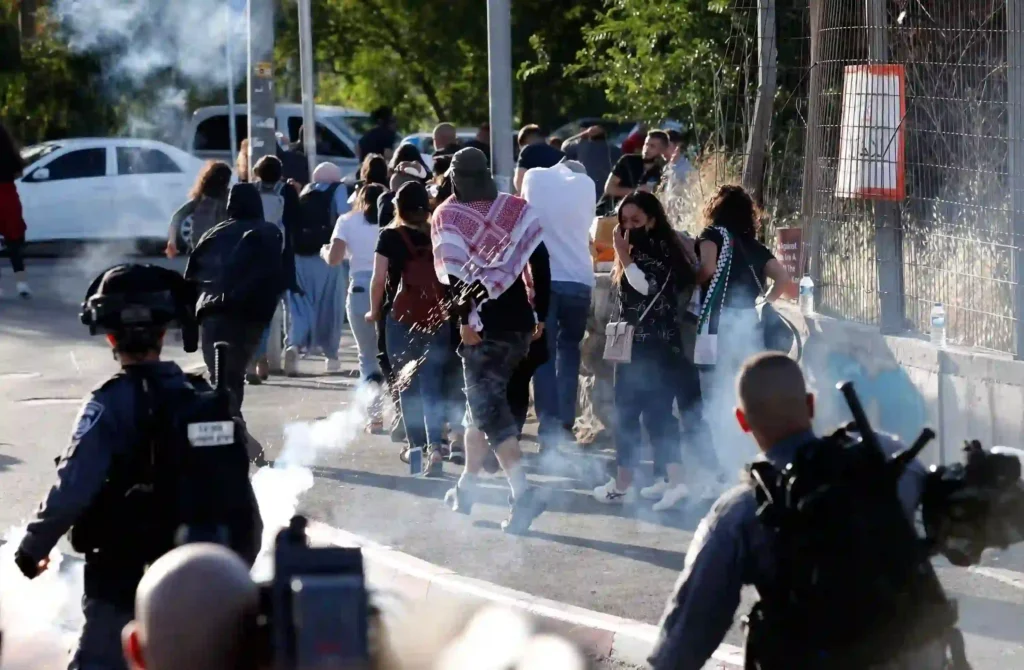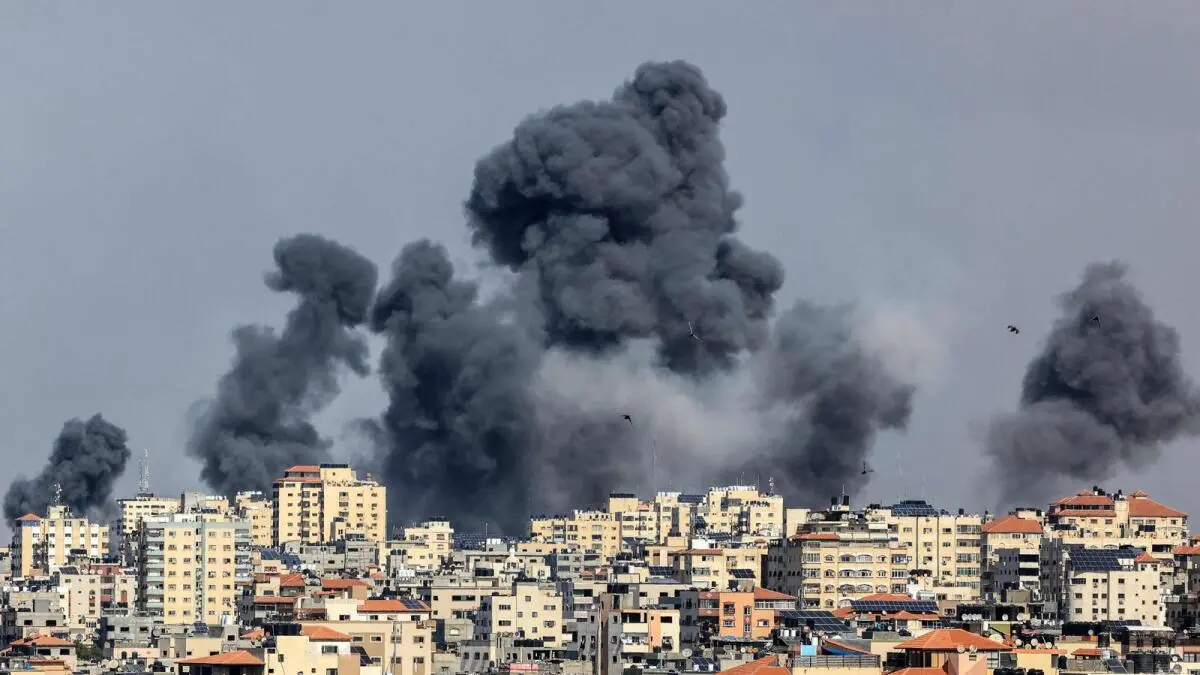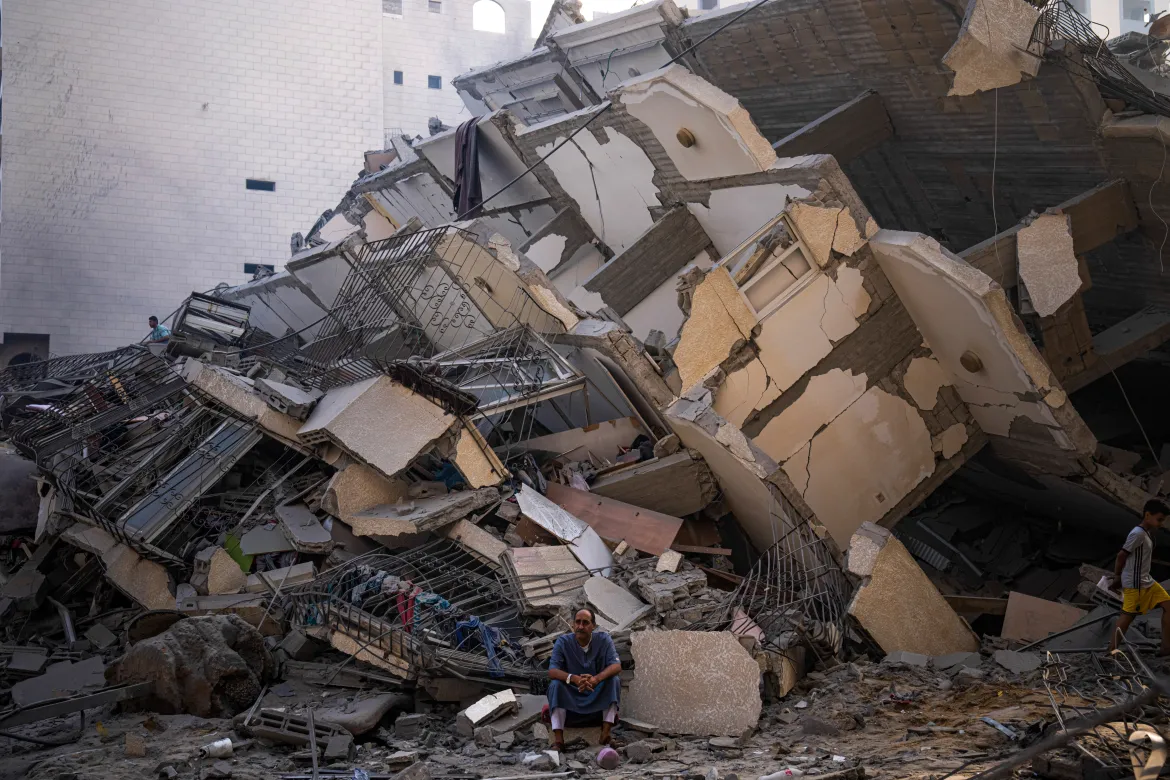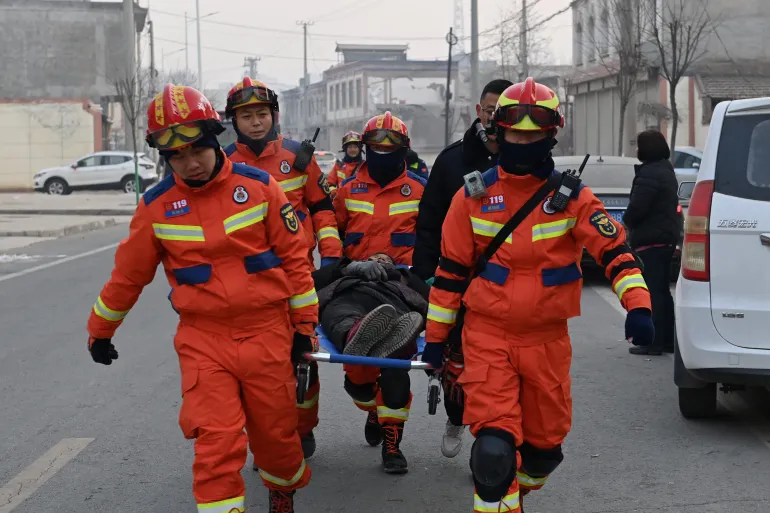Israel-Palestine War News LIVE Updates (12:20 PM GMT, 10 October): Amidst ongoing clashes in the Gaza Strip, hospitals find themselves stretched to their limits as the Israeli army’s bombardment continues. This escalation follows a bold move by Hamas, who sent rockets and fighters into Israel, marking an unprecedented attack.
In response to this dire situation, the Palestinian health ministry and the World Health Organization (WHO) have jointly called for the establishment of a humanitarian corridor. Their plea aims to ensure the swift entry of critical medical supplies into Gaza’s beleaguered hospitals.
Adding to the complexity of the situation , Israel has declared a comprehensive blockade on Gaza, which includes restrictions on the admission of essential supplies like food and fuel. Such a blockade, with its implicit intent to deprive the population, is viewed as a violation of international law and is categorized as a war crime according to UN statutes.
Tragically, the current death toll stands at a devastating 770 Palestinians in Gaza and over 900 individuals in Israel. This latest outbreak of violence follows a series of events, including the surprise attack by Hamas in response to Israeli settler incursions into the Al-Aqsa Mosque compound and a record number of Palestinian casualties caused by Israeli actions in recent months.

Recent updates from Israeli media indicate that the death toll in Israel has tragically risen to a minimum of 600 lives.
On Saturday, Palestinian militants launched an alarming onslaught, firing over 5,000 rockets from the Gaza Strip into Israel. This barrage resulted in the tragic loss of at least 300 lives and left numerous others wounded. The relentless rocket attacks set off air raid sirens across Israel, plunging the nation into a heightened state of alert and raising the specter of further intense confrontations.
Adding to the complexity of the situation, hundreds of Hamas militants made daring infiltrations into Israeli territory, employing a variety of unconventional means including SUVs, motorcycles, and even paragliders. These infiltrators opened fire indiscriminately on civilians, compounding the sense of chaos and insecurity.
The initial morning onslaught persisted for more than 30 harrowing minutes, prompting Israel to declare a “state of war” in response to the escalating violence and the grave threat it poses to its citizens and security.
Here’s a snapshot of the current situation:
(11:41 AM GMT)
- Ongoing gun battles persist between Israeli forces and Palestinian fighters in Ashkelon and various southern Israeli regions.
- According to the most recent updates from Israeli media, the toll of Israeli casualties resulting from Hamas attacks has tragically surged to a staggering 600 fatalities, with over 2,000 individuals sustaining injuries.
- In parallel, the Palestinian Health Ministry in Gaza has reported a grim tally of at least 313 lives lost and nearly 2,000 people wounded as a consequence of Israeli military actions.
- In an unrelated and deeply unfortunate incident, in Egypt’s Alexandria, an Egyptian police officer took the lives of two Israeli tourists and their Egyptian guide.
Adding to the complexity of the situation, a senior Hezbollah official conveyed a message of support to Hamas fighters, affirming, “our guns and rockets are with you.” This declaration came in the wake of the group’s claim of responsibility for mortar strikes directed at an Israeli position. The situation remains fluid and highly charged.
Israel-Gaza Conflict Escalates: 44 Israeli Soldiers and 30 Security Officials Killed
11:21 AM (GMT)
Israeli authorities have identified 44 soldiers and 30 security service members who were killed in a Hamas attack on Saturday. The security service members who died were police and border officers, as well as members of Israel’s National Counter Terror Unit, the Yamam. “This is a significant loss of life, and it is a reminder of the high cost of conflict.” Our thoughts are with the families of the victims.
We hope that all parties involved in the conflict will work towards a peaceful resolution. Violence is never the answer, and it is always the innocent who suffer the most.
Dozens of Tanks Reported on the Move Towards Southern Israel
11:25 AM (GMT)
Israeli media is reporting that the Israeli army has mobilized dozens of tanks to southern Israel, where fierce battles are ongoing between Israeli troops and Hamas fighters who entered from the Gaza Strip.
The mobilization of tanks is a sign that the Israeli military is taking the threat from Hamas seriously. Tanks can provide powerful firepower and protection for Israeli troops, and they can also be used to clear obstacles and create paths for infantry.
The ongoing battles in southern Israel are a reminder of the fragility of the ceasefire between Israel and Hamas. Both sides have been accused of violating the ceasefire, and there is a growing risk of a wider conflict.
It is important to note that these are reports from Israeli media, and they have not been independently verified. However, the mobilization of tanks is a significant development, and it is likely to raise tensions in the region.
Iranian Officials Expressing a Sense of Victory: Al Jazeera Reports
Iranian officials are celebrating Hamas’s recent attack on Israel, calling it a victory and a sign of Israel’s weakness. But the Iranian public is less enthusiastic, with many people worried about the potential for retaliation from Israel.
The contrasting reactions highlight the complex relationship between Iran and Israel. The two countries are bitter rivals, but they are also interconnected in many ways. Iran is a major supporter of Hamas, and it is believed to supply the group with weapons and financial assistance.
The Hamas attack on Israel is a reminder of the fragility of the ceasefire between the two countries. Both sides have been accused of violating the ceasefire in recent months, and there is a growing risk of a wider conflict.
What World’s Leaders Respond to Hamas Militant Attack on Israel?
UN: The UN’s human rights chief, Volker Turk, urgently appealed for a halt to the violence, urging all parties involved and key regional countries to de-escalate and prevent further bloodshed. He expressed deep concern about reports of Israeli civilians being taken hostage.
EU: EU chief Ursula von der Leyen condemned the attack carried out by Hamas terrorists against Israel in no uncertain terms, categorizing it as terrorism in its most reprehensible form. She asserted Israel’s right to defend itself.
EU foreign policy chief Josep Borrell called for an immediate end to the horrific violence and stressed that terrorism and violence would lead to no solutions. The EU expressed solidarity with Israel during these challenging times and strongly denounced the taking of civilians as hostages, emphasizing its violation of international law.
Brazil: As the current president of the UN Security Council, Brazil condemned the attacks on Israel. Their foreign ministry urged all parties to exercise maximum restraint to prevent further escalation and announced an emergency UN Security Council meeting scheduled for Sunday.
Russia: Russia’s foreign ministry called for an immediate ceasefire and implored both the Palestinian and Israeli sides to renounce violence and show restraint. They emphasized the importance of international community assistance in establishing a lasting and long-awaited peace process.
Ukrain: President Volodymyr Zelensky acknowledged Israel’s unequivocal right to self-defense.. He condemned terrorism as a crime against humanity and called for reason and restraint in handling the situation.
Turkey: Turkish President Recep Tayyip Erdogan urged Israel and the Palestinians to avoid further escalation, advocating for reasonable actions and a de-escalation of tensions. Erdogan has consistently been a vocal advocate for the Palestinian cause..
France: France expressed its full solidarity with Israel and the victims, unequivocally rejecting terrorism and committing to Israel’s security. President Emmanuel Macron firmly condemned the attacks.
Germany: German Foreign Minister Annalena Baerbock affirmed Israel’s full solidarity and the right, as guaranteed by international law, to defend itself against terrorism.
Britain: British Prime Minister Rishi Sunak expressed shock at the attacks and reiterated Israel’s absolute right to self-defense. In a subsequent tweet, he strongly condemned the actions by Hamas, characterizing them as cowardly and depraved.
South Africa: South Africa’s foreign ministry expressed grave concern over the recent escalation in the Israeli-Palestinian conflict. They emphasized the urgent need for a credible peace process that aligns with previous UN resolutions, advocating for a two-state solution and a just and comprehensive peace between Israel and Palestine.
Egypt, a country that signed a historic peace treaty with Israel in 1979, took to social media, urging restraint and warning of the repercussions of the escalation. The Egyptian Foreign Ministry called upon the international community to intervene and demand that Israel cease its attacks on Palestinian territories. Foreign Minister Sameh Shoukri engaged in diplomatic efforts to defuse the situation.
Jordan‘s Foreign Ministry called for calm, protection of civilians, and adherence to international humanitarian laws. Jordanian Foreign Minister Ayman Al-Safadi stated that they were working intensively with regional and international partners to seek urgent international action and prevent further escalation.
On the other hand, several countries praised the attacks carried out by Hamas against Israel.
Iraq, through a statement from the media office of the Iraqi Prime Minister, characterized the attacks as a natural response to the prolonged oppression faced by the Palestinian people.
Qatar, which has hosted the Hamas Political office since 2012, placed responsibility squarely on Israel for the escalation, citing ongoing violations of Palestinian rights.
Iran and Syria issued statements of support for the Hamas attacks through their government news media. Iranian Foreign Minister Nasser Kanaani congratulated the Palestinian people and highlighted the significance of the operation in their resistance against the occupiers.
Lebanese Hezbollah offered congratulations to Hamas, referring to the operation as “large-scale” and “heroic.” They expressed keen interest in the developments on the Palestinian scene.”
Netanyahu Issues Warning of a ‘Long and Challenging War’ on Surprise Hamas Attack on Israel
Israeli Prime Minister Benjamin Netanyahu Warns of Prolonged and Challenging Conflict Following Surprise Attack by Gaza Militants
In a shocking turn of events, Palestinian militants from the besieged Gaza Strip launched a surprise attack, resulting in hundreds of casualties, the taking of numerous Israeli hostages, and triggering concerns of a wider regional conflict. Reports suggest that up to 100 Israeli citizens, including women and children, may have been abducted. The death toll on the Israeli side has reached 350, mirroring a similar number of casualties on the Palestinian side
Hezbollah Claims Responsibility for Targeting Israeli Sites
Lebanese political and militant group Hezbollah has claimed responsibility for attacking three Israeli sites in Shebaa Farms, a disputed territory on the border between Lebanon and Israel. Hezbollah launched missiles and artillery at the sites, which it considers to be Israeli-occupied territory.
The Israeli Defence Forces (IDF) has retaliated against the attack, striking targets in the area and destroying Hezbollah terrorist infrastructure. The IDF (Israel Defense Forces) has confirmed that it has undertaken preparatory measures for such contingencies and remains committed to operating in all areas and whenever necessary to safeguard the well-being of Israeli civilians.
The exchange of fire between Hezbollah and the IDF is a reminder of the fragile situation on the border between Lebanon and Israel. The two sides have fought several wars in the past, and the region has been tense in recent months.
It is important to note that both Hezbollah and the IDF have released their own versions of events, and it is difficult to say definitively what happened. However, it is clear that the situation on the ground is serious, and there is a risk of a further escalation of violence.
Hezbollah: Rising from the Ashes of Conflict – A Short Story of Formation and Power
History
Born in the turbulent aftermath of the Israeli invasion of Lebanon in 1982, Hezbollah emerged under the guidance of Lebanese Shia clerics who had studied in Najaf, Iraq. With substantial support from Iran’s Islamic Revolutionary Guard Corps (IRGC), the group amalgamated various Lebanese Shia factions into a cohesive entity united in their determination to resist the Israeli presence in Southern Lebanon.
Rooted in the teachings of Ayatollah Ruhollah Khomeini, the architect of the Iranian Revolution, Hezbollah’s 1985 manifesto articulated ambitious goals – the annihilation of Israel, the expulsion of Western powers from Lebanon, and the establishment of an Islamic state within the country. Their allegiance to Iran’s Supreme Leader further cemented their ideological foundations.
During the early 1980s, Hezbollah’s focus lay in guerrilla warfare against Israeli forces in Southern Lebanon, while also orchestrating terrorist attacks against Israeli and Western targets abroad. The tragic 1983 bombing of the US Marine barracks in Beirut, resulting in the loss of 241 lives, marked a particularly devastating episode.
In the subsequent decade, Hezbollah transformed into a political force. In 1992, the group participated in Lebanese elections, securing eight parliamentary seats. Simultaneously, Hezbollah extended vital social services to its supporters, establishing schools, hospitals, and housing initiatives.
Today’s presence
Today, Hezbollah stands as a formidable presence in Lebanese politics and boasts one of the region’s best-equipped militias. Its reach extends into the Syrian civil war, where it aligns with the Syrian government forces.
What Are the Aims of Hezbollah?
Hezbollah’s aims are complex and multifaceted, and they have evolved over time. However, some of the group’s core objectives include:
- The resistance against the Israeli occupation of Lebanese territory involves challenging and, ultimately, aiming to eliminate Israel’s presence. This is Hezbollah’s most well-known aim, and it is the one that has led to the group’s most significant military engagements. Hezbollah has fought Israel in several wars, including the 1985–2000 South Lebanon conflict and the 2006 Lebanon War.
- Promoting the standing of Shi’a communities worldwide. Hezbollah is a Shi’a Muslim group, and it sees itself as a champion of Shi’a interests around the world. The group has provided support to Shi’a communities in Iraq, Syria, and Yemen, among other countries.
- Undermining Arab states with Shia minorities is part of an effort to export the Iranian Shia revolution. Hezbollah is closely allied with Iran, and it shares Iran’s goal of promoting Shi’a Islam in the Middle East. The group has been accused of supporting Shi’a militias in Iraq and Syria, and it has also been linked to attacks on Saudi Arabia and other Sunni-majority countries.
- Serving as the long arm of Iran in coordination with the Islamic Revolutionary Guard Corps-Quds Force (IRGC-QF). Hezbollah is one of Iran’s most important proxies in the region, and it plays a key role in Iran’s power projection efforts. The group has been involved in a wide range of Iranian-backed activities, including military operations, intelligence gathering, and terrorist attacks.
In addition to these core objectives, Hezbollah also plays an important role in Lebanese politics. The group has participated in Lebanese elections since 1992, and it has held one to three seats in each Lebanese government formed since then. Hezbollah also has a vast social welfare network in Lebanon, which it uses to build support and influence among the Lebanese population.
It is important to note that Hezbollah’s aims are not universally supported. The group is considered a terrorist organization by the United States, Israel, and several other countries. Hezbollah is also a controversial figure within Lebanon, with some Lebanese citizens viewing it as a legitimate resistance movement and others viewing it as a dangerous militia that undermines Lebanese sovereignty.
The international community must do everything it can to prevent a further escalation of the conflict. It is important to urge all parties to respect the ceasefire and to engage in meaningful dialogue. The international community must also work to address the root causes of the conflict, including the Israeli occupation of the Palestinian territories and the blockade of the Gaza Strip.
Thank you so much for reading. Please subscribe our website to be updated with latest news feeds.!
Frequently Asked Question (FAQ)
Why are Hamas and Israel fighting?
Hamas is a Palestinian militant group that controls the Gaza Strip. Israel is a country that borders the Gaza Strip. Hamas and Israel have been fighting for many years, over a number of issues, including:
- The Israeli occupation of the Palestinian territories
- The blockade of the Gaza Strip
- The status of Jerusalem
- The right of return for Palestinian refugees
What is the latest death toll in the conflict?
The latest death toll in the conflict is over 600 people, with thousands more injured. The majority of the casualties have been Palestinians.
Is there a ceasefire in place?
As per recent updates on 8 october 5:00 PM IST, there is no ceasefire in place. The international community has called for a ceasefire, but there is no sign of one yet.
What is the international community doing to stop the violence?
The United Nations Security Council has held several emergency meetings on the conflict, but it has been unable to reach consensus on a resolution. The United States is working with both sides to try to broker a ceasefire.
What can I do to help?
There are a number of things you can do to help, including:
- Donate to humanitarian organizations that are providing relief to the people of Gaza.
- Contact your elected officials and urge them to support a peaceful resolution to the conflict.
- Educate yourself and others about the conflict and its root causes.
What is the long-term solution to the Israel-Hamas conflict?
There is no easy answer to this question. The conflict is complex and has a long history. However, some possible solutions include:
- A two-state solution, with Israel and Palestine living side-by-side in peace and security.
- A one-state solution, with a democratic state for all Israelis and Palestinians.
- A confederation, with two separate states that are closely linked.
It is important to note that these are just a few possible solutions, and there is no consensus on which one is the best. The long-term solution to the conflict will likely require a compromise from both sides.






2 thoughts on “Israeli-Palestine Conflict Rages On, Israel-Hamas war day 4 LIVE updates:”